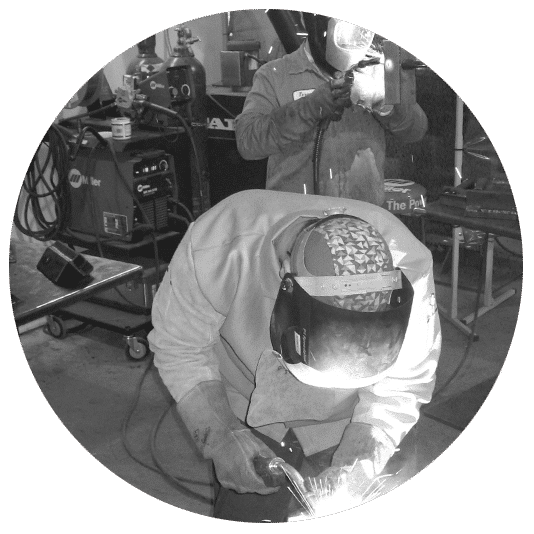FAQ
Weld Training Center

frequently asked questions
Founded in 2007, our unique Weld Training Center is an in-house and on-campus school we use to train brand new welders or enhance skills of existing welders on our teams.
If you have questions, please contact our HR department at [email protected].
For years, American manufacturing has been dealing with a shortage of qualified welders. We decided to stop waiting for someone else to fix the problem and do something. The center is used to train and certify brand new welders. Additionally, our existing welders get certified and add new skills to their abilities.
The only cost to participants are the candy bars and pop cans in the vending machines! Classes are free for all employees and – in fact – you get paid while you attend! You’re saving thousands of dollars normally paid to schools or for profit training organizations.
Of course, but first you need a job here! Training is only offered to employees of Superior Industries. If you want to be a welder, simply apply for a welding position or complete our general application. In the application, be sure to state that you have no welding experience, but are hungry to learn and grow. If you’re hired, a customized weld training program will be established for you.
We’re accredited to train using content from the American Welding Society (AWS) and The American Society of Mechanical Engineers (ASME).
There’s a list of hundreds of certifications you can take advantage of in our Weld Training Center including groove and fillet welds in all positions, gas metal arc (MIG), pulse, constant voltage (CV), gas tungsten arc (TIG), stick, subarc, and aluminum welding procedures. The only process we don’t cover is working with explosives. We also use classroom time to teach safety, theory, blueprint reading, equipment operation, maintenance, and the basics of metallurgy.

Dave Dybdal has been a Superior employee for more than a quarter century. His passion for welding is legendary throughout the country. Both AWS and ASME have awarded “Dybs” with their Certified Welding Inspector and Certified Welding Educator designations, which means he’s certified to teach and evaluate codes and standards.
Additionally, Dybs sits on the welding program boards at Alexandria Technical College (where he’s also a substitute teacher) and the North Dakota State College of Science. He was a top ten finisher in a national welding competition where he’s now a judge.
We have a dedicated building on the campus of our sister company, Westmor Industries, in Morris, Minnesota. That’s where most of the training happens. If you’re employed at a plant outside of Morris, you may travel here to participate. Our instructors will also travel to other company locations. Some departmental specific training integrated within their production space.
We have awesome relationships with all of the major welding technology manufacturers and use the latest equipment in our training center and production facilities. Our manual, robotic and automated welding equipment comes from Lincoln Electric, Miller Electric, and Fronius Welding. We even use virtual welding simulators.
There are hundreds of certifications and it’s typical for most courses to last about two to three weeks. Our most extreme certification takes six weeks to complete.
In some cases they do, but it all depends on timing. We usually like to have at least 3-4 students per class. It’s still small enough for plenty of one-on-one attention from the instructor, but you’ll also learn from your peers in the class.
Before students attend classes (especially those with no welding experience) they usually spend some time working on the shop floor. Learning about the equipment they are building is lesson number one.
It’s not a one size fits all curriculum here. We focus on certifications that you want to earn, and bypass content you have no interest in (as long as the instruction is within the guidelines of AWS or ASME).
Best of all, you’re not paying someone to teach you…we’re paying you!
You get paid as you normally would as an employee of Superior Industries. With that said, community and technical colleges serve an important purpose in our society. We passionately support these schools and their teachers!

